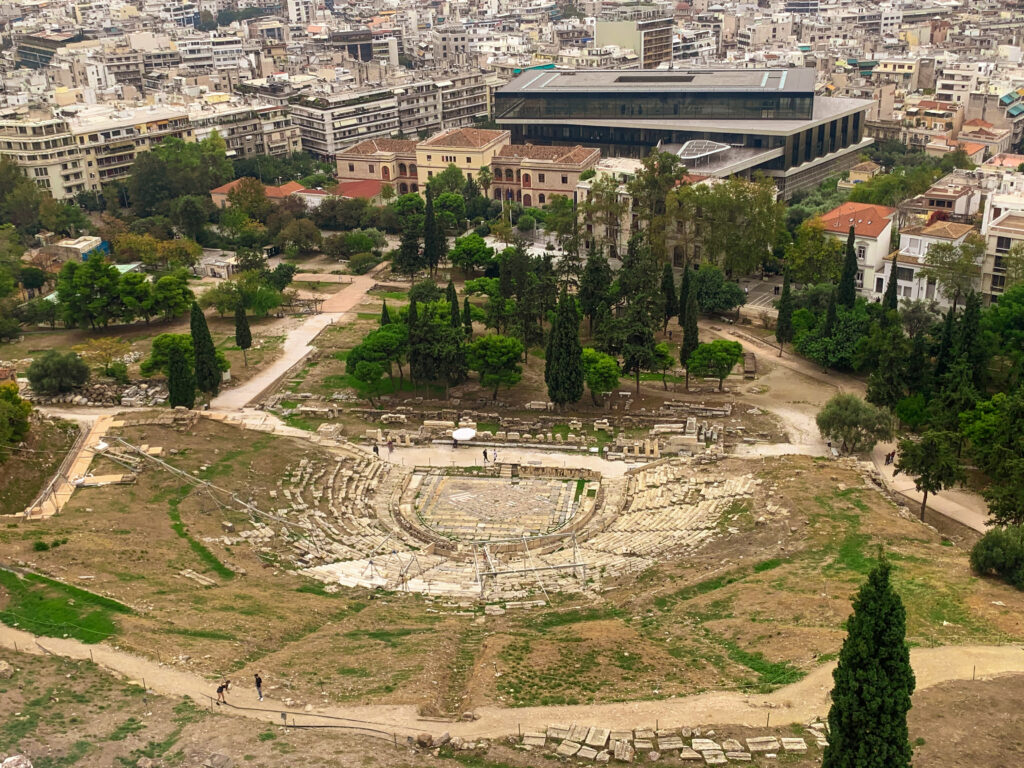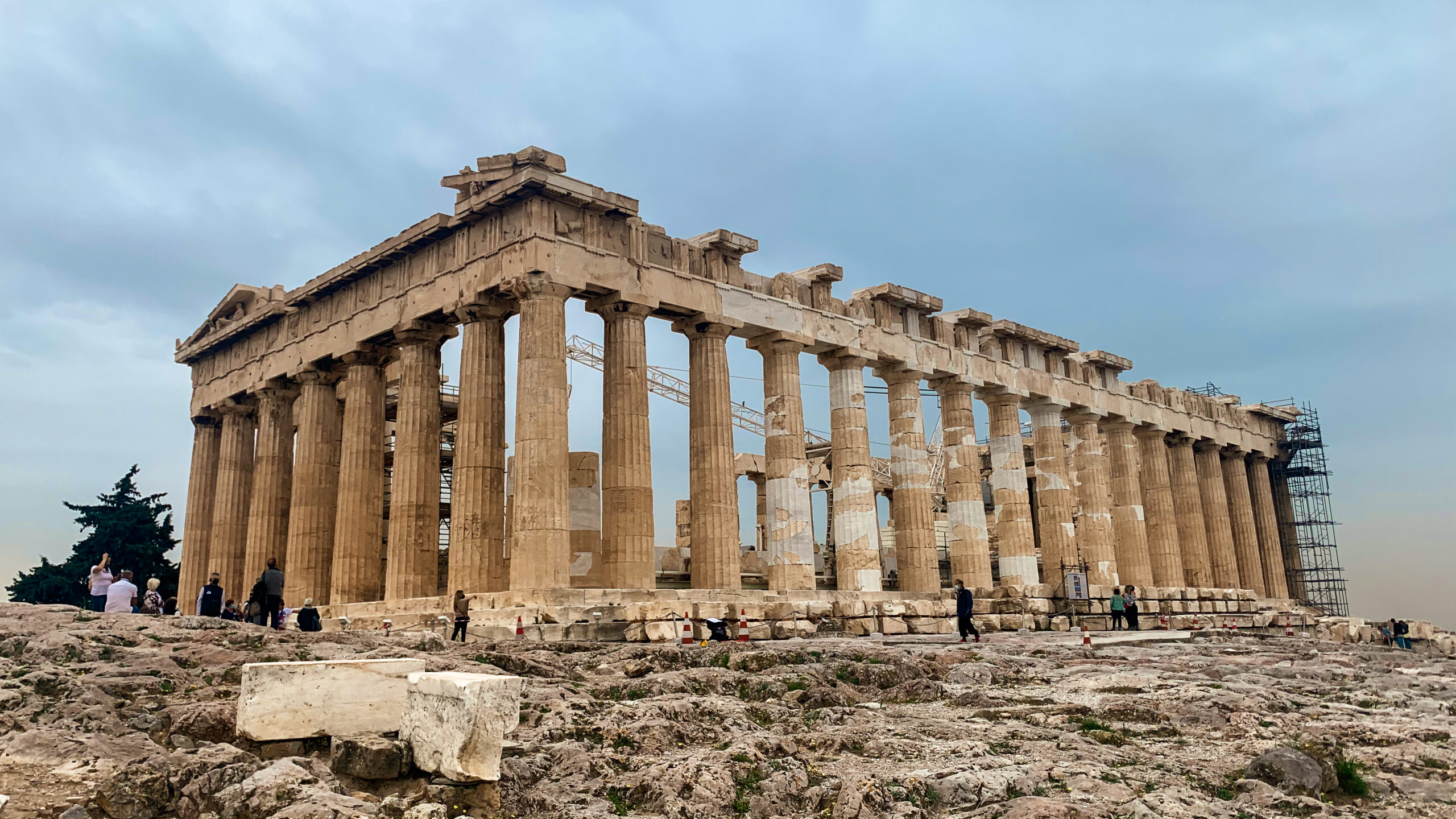Greece
Menu
Greece is made up of thousands of islands located in South East Europe and attracts millions of worldwide visitors every year. It is well known for its idyllic islands, stunning beaches, incredible history, and its intriguing Greek Mythology. It is also the origin of the Olympic Games.
Discover more about Greece and plenty of what it has to offer…
Greece - Key Facts
Population – Around 11 million (2021).
Athens
Athens is the capital city of Greece and is full of incredible historic landmarks, including its world famous Acropolis. It is the largest city in Greece and provides great links to many of the stunning Greek islands. Athens is located on mainland Greece and is accessible from many airports; there are a number of non-stop flights every day from UK airports and should be around a 3.5 – 4 hour flight. The airport code for Athens is ATH.
Athens attracts visitors all year round, but generally the best time to visit is March to May or October and November; these are generally cheap times to visit and the weather is warm. It is much cheaper to visit in December to February, however, it is usually quite cool and wet. And the summer months (June to September) are more pricey and incredibly hot.
It is the perfect location for a city break, where you can experience the wonderful Greek culture and their incredible cuisine. Athens does have some beautiful beaches, but if it’s a beach holiday you are after, then check out some of the Greek islands below.
At the bottom of this post, you will find a list of must-see sights in Athens.
The Islands
Greece has thousands of islands, although, only 227 of those islands are inhabited; still, there is plenty of choice for places to visit. Greece is incredibly popular for holiday makers wanting a beach getaway; ideal for families, couples and solo travellers. A number of the islands also make for extremely attractive wedding venues. Here are a selection of some of the most popular Greek islands:
Corfu
Corfu is one of the Ionian Islands in Greece where you will find stunning beaches and clear waters. There is plenty of history in Corfu; make sure you take a trip to Corfu town to explore more than the beaches. Holiday season is generally March to October; as with most of Greece, the summer months of June to August are the hottest and priciest. March to May and September to November is usually warm and quieter. Airport code is CFU.
Crete
Crete is the largest of the Greek islands and the capital city is Heraklion, which is one of the most popular locations for holidaying on Crete; another popular location is Chania. Plenty of holiday companies will offer holiday packages in both locations. The holiday season usually begins in around April to May and will last until October to November. In April to June, you will find some lovely weather and it is not overly busy; the island becomes much hotter and busier during the summer months of July and August. You will find September to November quieter again, but still with some lovely weather. Airport code is HER.
Kos
Kos is one of Greece’s Dodecanese Islands (along with Rhodes), and located in the south east of the Aegean Sea. It is one of the most popular islands for nightlife with plenty of clubs and bars to choose from. This is an ideal location for anyone who enjoys a vibrant nightlife. The best time of year to visit Kos is between April and October when the weather is warm; July is the hottest month, and generally the busiest. There are direct flights to Kos and the airport code is KGS.
Mykonos
Mykonos is one of the beautiful Cyclades Islands, south east of the mainland. It is well known for its white washed buildings and buzzing nightlife; according to Lonely Planet, Mykonos is “Greece’s answer to Ibiza”. It is most popular in the summer months, with July and August being the busiest; the holiday season starts in around April and ends in October. The winter months are generally very quiet and much cooler. Mykonos airport has the code JMK.
Rhodes
Rhodes is another of the Dodecanese islands popular with holidaymakers. A great location for beach lovers and equally great for those who want to explore. Rhodes has an extensive history and is home to one of the seven wonders of the ancient world: Colossus of Rhodes – a statue of Helios, the Greek sun God. April to October is the best time to visit, when the weather is warm; it is hottest in the summer months of July and August and also the busiest. The winter months are generally quieter and cooler. The airport code is RHO.
Santorini
Santorini is another of the Cyclades Islands and is well renowned for its idyllic beaches and iconic white and blue Greek buildings. It is a hugely popular destination for weddings and it’s easy to see why; Santorini has an incredibly romantic setting and gorgeous views. The holiday season in Santorini usually begins in around April and will last until October. April and October are warm and relatively quiet; the hottest and busiest months being July and August. There is not too much to do in Santorini during the months of November to March, and the climate is much cooler. The airport code for Santorini is JTR.
Zakynthos
Zakynthos, also known as Zante, is a popular party and nightlife destination located in the Ionian Sea. While it is popular for nightlife, it also has some amazing family friendly resorts. Like all of the Greek islands, the best time to visit Zakynthos is between the months of April to October, when it is warm. July and August are the hottest and busiest months. The airport code for Zakynthos is ZTH.
Check Greek entry requirements here before travel. You should also check travel advice in your home country.
National Holidays
1st January
New Years Day – many shops and sights will be closed on New Years Day.
6th January – Epiphany
This marks the end of Christmas and is a day of joy and celebration. Many shops and restaurants are closed on this day, but generally sights are open.
Clean Monday
Date varies each year. Clean Monday may also been known as Ash Monday/Orthodox Shrove Monday. The date of Clean Monday varies each year, as it marks the beginning of lent for the Eastern Orthodox Church (Julian calendar). Many shops are closed on this day, but many sights and restaurants remain open.
25th March – Greek Independence Day
This marks the beginning of the revolution against the Ottoman Empire in 1821. On this day, a majority of shops will be closed, but restaurants should still be open. Many of the sights will be closed, however, the Acropolis Museum usually has free admission to visitors on this day.
Easter Holy Week
All dates vary depending which date Easter Sunday occurs. Key events usually occur in April, but can sometimes fall in early May.
- Orthodox Good Friday – date varies each year. Shops and sights may operate on reduced opening hours; usually the Acropolis and the Acropolis Museum are open in the afternoon. You may find many restaurants and cafes are closed.
- Holy Saturday – date varies each year. Shops, restaurants and sights should be open.
- Orthodox Easter Day – date varies each year. Many shops and sights will be closed on Easter Sunday. Restaurants and cafes are usually open for those who want to enjoy their Easter meal out.
- Orthodox Easter Monday – date varies each year. Many shops will remain closed on Easter Monday but plenty of restaurants and cafes should be open. Sights are generally open, but may operate reduced hours.
1 May – Labour Day/May Day
In Greece, this is more commonly known as ‘Protomagia’. Protomagia is the celebration of spring and nature and is observed with a flower festival. Many shops and sights are closed, but generally, restaurants are open.
Whit Monday
Also known as Orthodox Pentecost Monday. The date varies as it occurs 50 days after Easter Sunday. This is a public holiday, but a many shops, restaurants and sights will be open.
15 August – Assumption Day
Many shops will be closed. Restaurants, cafes and sights should be open.
28 October – Ochi Day
May also be seen as Ohi Day and this day is celebrated with military parades. Many shops are closed, but plenty of restaurants, cafes and sights are open. The Acropolis Museum usually has free admission to visitors on this day.
25 December – Christmas Day
Most shops and sights will be closed on this day. Some restaurants may be open for those who choose to dine out.
26 December – Synaxis of the Mother of God
Most shops and sights will be closed on this day. Some restaurants and cafes may be open.
Greek Mythology
Greek Mythology is a collection of stories which have been told for thousands of years and based on a number of Gods, Goddesses and other important characters. The purpose behind these myths is to teach valuable life lessons or to explain various events, such as extreme weather or even death. Each of the Gods and Goddesses have their own characteristics and specific powers; while there are plenty of important characters within the mythology, there are 12 ‘major’ Greek Gods or Goddesses who are thought to have ruled the universe from the top of Mount Olympus (the highest mountain in Greece).
The 12 Major Gods and Goddesses, known as the Olympians:
1. Zeus
Thought to be the most powerful of all Gods and the King of Olympus. Zeus is God of the sky and had the power to change the weather, for example, thunderbolts would occur if he was unhappy. Hera is his wife, and his children include Artemis, Apollo, Athena, Dionysus, Hermes and Ares (amongst many more).
2. Hera
The Queen of Olympus and goddess of marriage and family. Hera was the sister and wife of Zeus.
3. Poseidon
The god of the sea, earthquakes, and horses is often depicted with a trident. Poseidon is the brother of Zeus and Hades (amongst others). Some of his children include Atlas, Orion and Pegasus.
4. Demeter
The goddess of agriculture and harvest. One of Zeus’ wives and mother to Persephone.
5. Athena
The goddess of wisdom and war and the daughter of Zeus. She is thought to have been born from Zeus’ forehead, although, there are alternative stories.
6. Apollo
The god of the sun, light, archery, music, knowledge, and more. Apollo is the son of Zeus and Leto and the twin brother of Artemis.
7. Artemis
The goddess of the wilderness, the hunt, and the moon. Daughter of Zeus and Leto and the twin sister of Apollo.
8. Ares
The god of war. Ares is the son of Zeus and Hera and is often shown as a violent and brutal character.
9. Aphrodite
The goddess of love and beauty. There are a number of stories about Aphrodite’s origin, some suggest her parents are Zeus and Dione and other stories suggest her father is Neptune.
10. Hermes
The god of wealth, luck, trade, and much more; Hermes is also known as the messenger god.
11. Dionysus
The god of wine and son of Zeus. Dionysus is also known as the god of theatre, and has a theatre named after him in Athens: the Dionysus Theatre.
12. Hephaestus
The god of fire and craftsmanship, including metalworks and capentry. The son of Zeus and Hera and was also married to Aphrodite.
Hades and Hestia are also very prominent characters within Greek Mythology, but generally are not considered one of the twelve Olympians. Hades is God of the Underworld and, therefore, does not live atop Mount Olympus. Hestia, Goddess of the Hearth, supposedly gave up her throne to Dionysus.
Sights to See in Athens
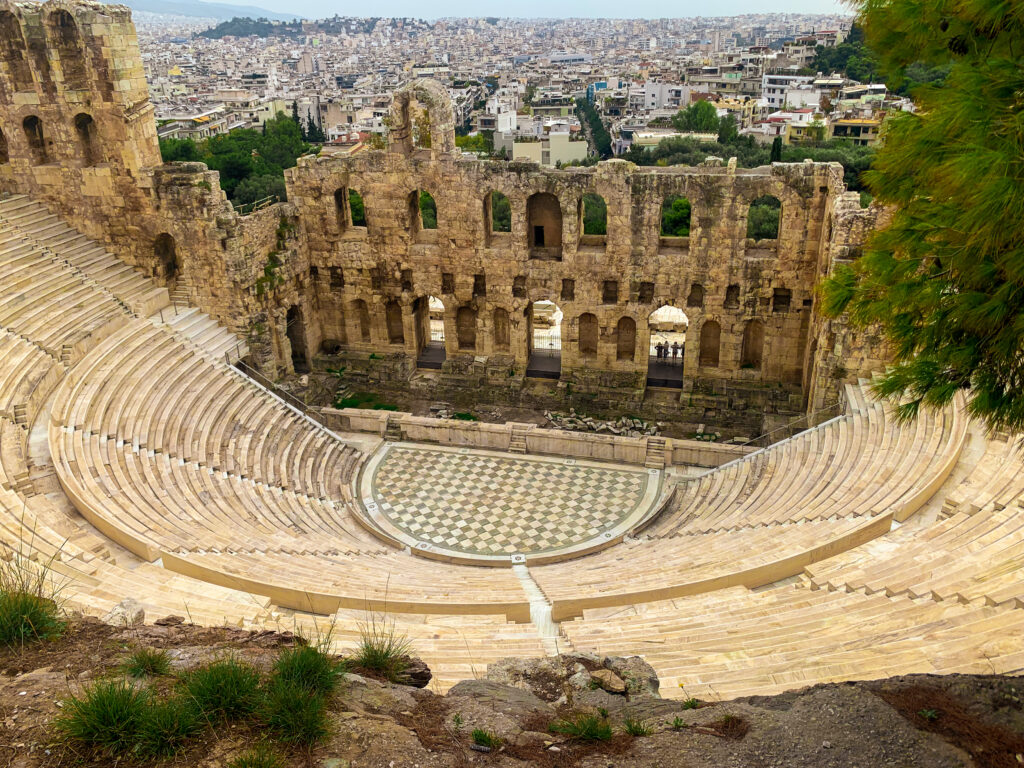
Odeon of Herodes Atticus
Odeon of Herodes Atticus, also known as the ‘Herodeon’, was built in 161 AD. It is located on the slope of the Acropolis and can seat up to around 5,000 people. The theatre was built by the philosopher, Herodes Atticus, in memory of his wife.
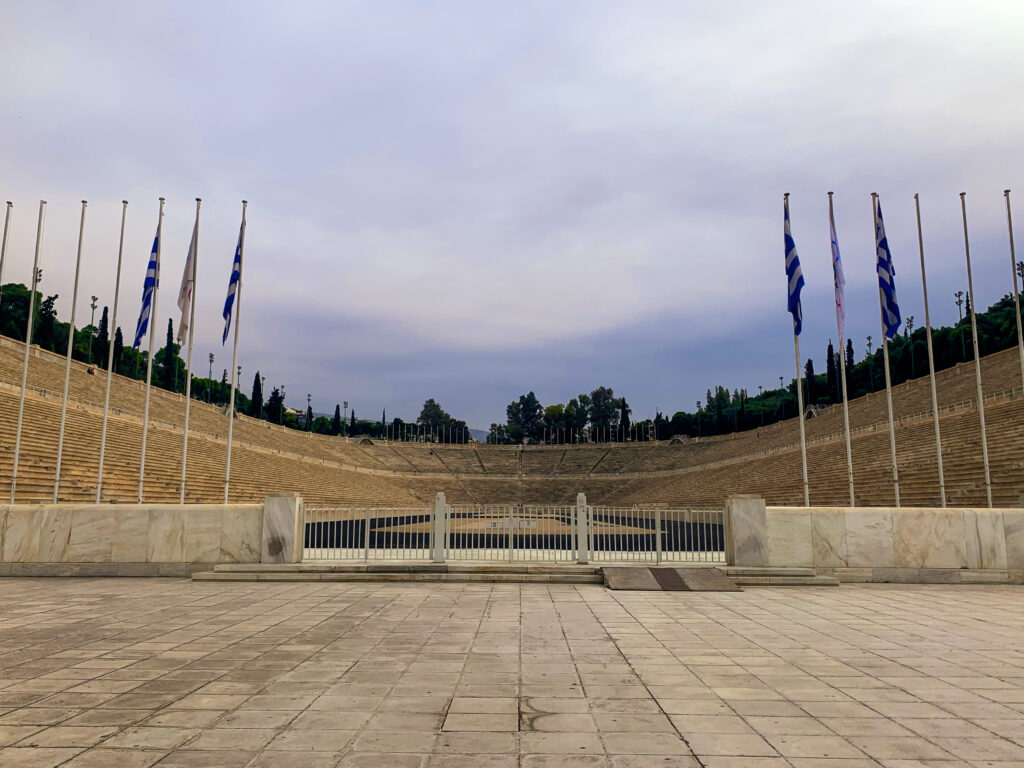
Panathenaic Stadium
The stadium was originally built in the 4th century BC and then restored for use in the first modern Olympic games in 1896. The first modern Olympics had 241 male participants from a total of 14 countries. The stadium is made entirely from marble.
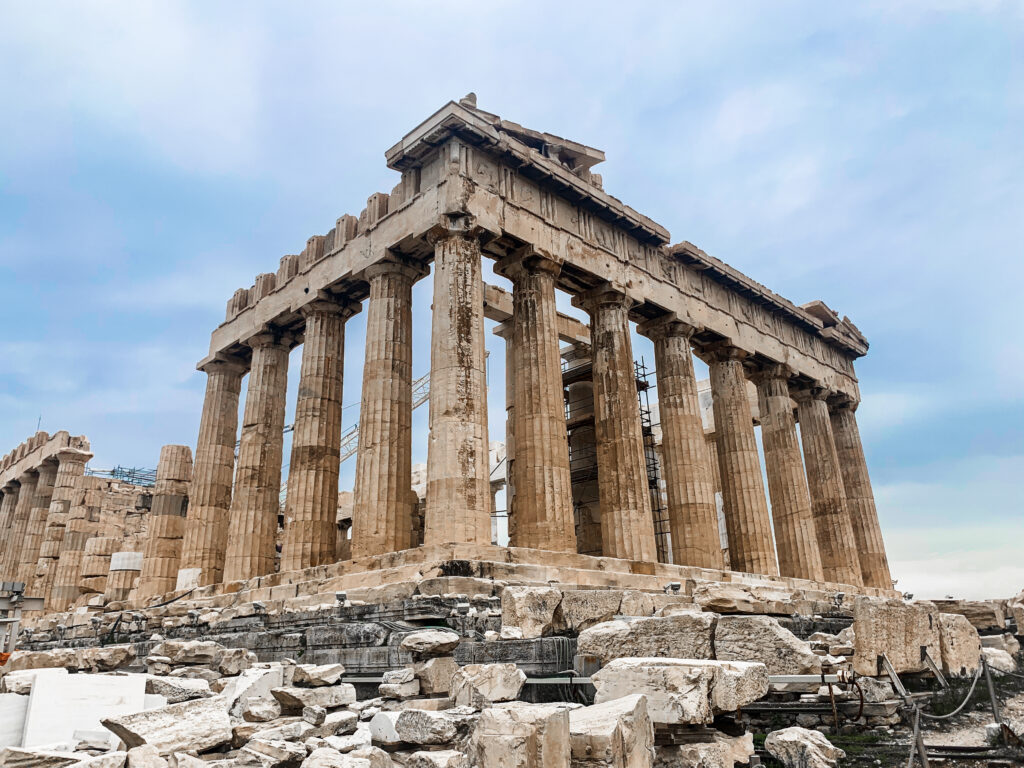
Parthenon
The Parthenon is located at the top of the Acropolis hill and is probably the most famous attraction in Athens. Construction began in the 5th century BC and it consists of 46 outer columns and a total of 19 inner columns; the temple was dedicated to the Greek goddess, Athena.
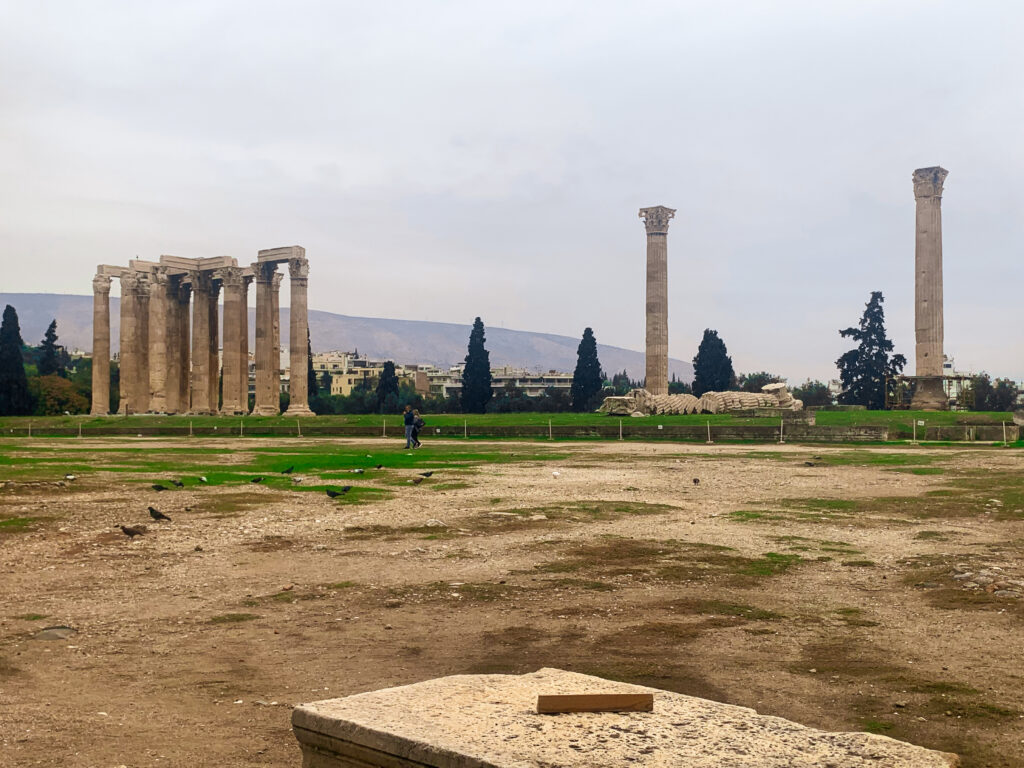
Temple of Zeus
The Temple of Zeus is likely to have been constructed in the 5th century BC. In its original form, the temple would have had 104 columns, but nowadays stands in ruins. The temple was built in honour of the Greek god, Zeus, and is an iconic location in Athens.
